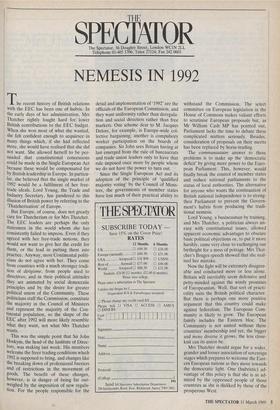SPECT THE ATOR
The Spectator, 56 Doughty Street, London WC1N 2LL Telephone 01-405 1706; Telex 27124; Fax 242 0603
NEMESIS IN 1992
The recent history of British relations with the EEC has been one of hubris. In the early days of her administration, Mrs Thatcher rightly fought hard for lower British contributions to the EEC budget. When she won most of what she wanted, she felt confident enough to acquiesce in many things which, if she had reflected more, she would have realised that she did not want. She allowed herself to be per- suaded that constitutional concessions could be made in the Single European Act because these would be compensated for by British leadership in Europe. In particu- lar, she believed that the single market of 1992 would be a fulfilment of her free- trade ideals. Lord Young, the Trade and Industry Secretary, has pandered to this illusion of British power by referring to the `Thatcherisation' of Europe.
But Europe, of course, does not greatly care for Thatcherism or for Mrs Thatcher. The EEC leaders are perhaps the only statesmen in the world whom she has consistently failed to impress. Even if they agreed with her free-trade notions, they would not want to give her the credit for them, or the lead in putting them into practice. Anyway, most Continental politi- cians do not agree with her. They come from countries with a much stronger tradi- tion of dirigisme, from people used to directives; and in their political attitudes they are animated by social democratic Principles and by the desire for greater Political union of the Community. These Politicians staff the Commission, constitute the majority in the Council of Ministers and represent the majority of the Con- tinental population, so the shape of the EEC after 1992 will more likely resemble What they want, not what Mrs Thatcher wants.
This was the simple point that Sir John Hoskyns, the head of the Institute of Direc- tors, was making last week. His members welcome the freer trading conditions which 1992 is supposed to bring, and changes like the breaking down of professional barriers and of restrictions in the movement of goods. The benefit of these changes, however, is in danger of being far out- weighed by the imposition of new regula- tion. For the people responsible for the detail and implementation of '1992' are the officials of the European Commission, and they want uniformity rather than deregula- tion and social direction rather than free markets. One scheme dear to M. Jacques Delors, for example, is Europe-wide col- lective bargaining; another is compulsory worker participation on the boards of companies. Sir John sees Britain having at last emerged from the rule of bureaucrats and trade union leaders only to have that rule imposed once more by people whom we do not have the power to turn out.
Since the Single European Act and its adoption of the principle of 'qualified majority voting' by the Council of Minis- ters, the governments of member states have lost much of their practical ability to withstand the Commission. The select committee on European legislation in the House of Commons makes valiant efforts to scrutinise European proposals but, as Mr William Cash MP has pointed out, Parliament lacks the time to debate these complicated matters seriously. Besides, consideration of proposals on their merits has been replaced by horse-trading.
The communautaire answer to these problems is to make up the 'democratic deficit' by giving more power to the Euro- pean Parliament. This, however, would finally break the control of member states and reduce national parliaments to the status of local authorities. The alternative for anyone who wants the continuation of British national independence is to streng- then Parliament to prevent the Govern- ment's hubris from producing the tradi- tional nemesis.
Lord Young, a businessman by training, and Mrs Thatcher, a politician always un- easy with constitutional issues, allowed apparent economic advantages to obscure basic political objections or, to put it more harshly, came very close to exchanging our birthright for a mess of pottage. Mrs That- cher's Bruges speech showed that she real- ised her mistake.
Now the fight will be extremely disagree- able and conducted more or less alone. Britain will inevitably seem defensive and petty-minded against the windy promises of Europeanism. Well, that sort of practi- cality suits the British political character. But there is perhaps one more positive argument that this country could make against federalism. The European Com- munity is likely to grow. The European family includes the Eastern bloc. The Community is not united without these countries' membership and yet, the bigger and more diverse it grows, the less close- knit can its union be.
Mrs Thatcher should argue for a wider, grander and looser association of sovereign stages which prepares to welcome the East- ern European nations as they move towards the democratic light. One (hubristic) ad- vantage of this policy is that she is as ad- mired by the oppressed people of those countries as she is disliked by those of the prosperous West.


























































 Previous page
Previous page